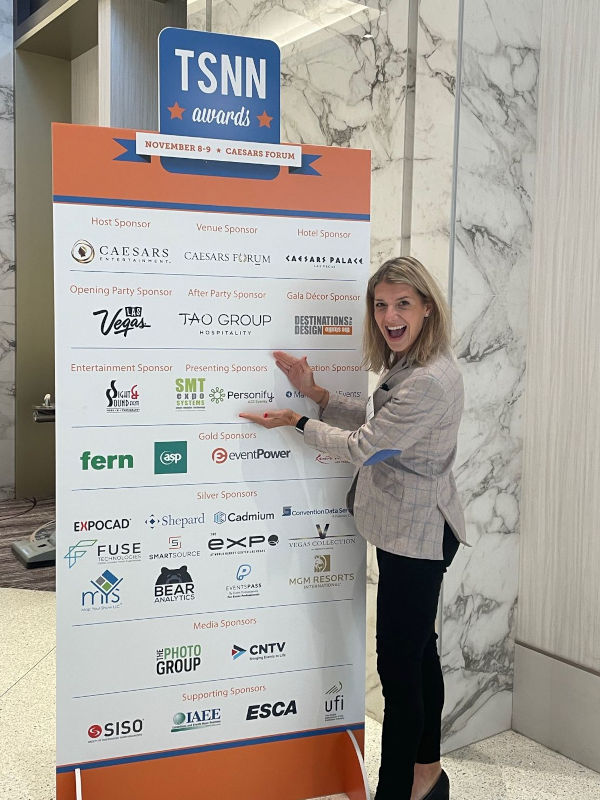It’s impossible not to think about (and perhaps worry a bit about) securing funding for your next event. Any event planner has funding at the back of their mind since it influences what you can do and how you’ll pull it off.
Event sponsorship is the way to go, but navigating how to secure funding for any type of event isn’t always simplistic. Not only do you need sponsors who offer enough funding, but you need to enter into contracts that protect your event and create an appealing opportunity for all parties.
Consider what goes into successful event sponsorship. In this guide, we’ll cover exactly what you need to do to be confident in your organization’s ability to secure sponsorships and host a successful event.
How Event Sponsorships Work
Event sponsorship is a collaborative marketing approach where an event organizer partners with a sponsor. This partnership is built around a well-defined agreement that ensures mutual benefits.
For event professionals, understanding this is key: successful event sponsorships hinge on a clear agreement of terms that serve the interests of both the event and the sponsor.
Let’s explore the typical structure of such partnerships.
- Event Planning and Budgeting: Initiate your event planning by creating the concept and estimating the costs involved to formulate a budget.
- Seeking Potential Sponsors: Approach potential sponsors with a proposal, seeking their support in providing funding or resources for your event.
- Offering Sponsor Benefits: Present the benefits to sponsors, such as advertising opportunities on the event’s merchandise or in marketing materials.
- Receiving Sponsor Contributions: In exchange, the sponsor provides support, which could be in the form of financial assistance, professional services, or other necessary resources for your event.
- Providing Brand Exposure to Sponsors: As a result of their contribution, sponsors gain increased brand awareness, making their involvement in your event beneficial.
Event sponsorship should be outlined in a contract. It should define all aspects of the event and the requirements, exclusions, and limitations of the relationship.
Note that as long as the event sponsor and the event host agree, the terms of the sponsorship can be as flexible as fitting. It should be written down as a legally binding agreement.

Types of Event Sponsorships
Choosing the right type of sponsorship is critical to the success of the relationship. There are four common types of sponsorships to consider:
- Financial sponsorships: The most common. The sponsor donates money to the organization or for a specific event and, in return, receives some public acknowledgment. This could be done by paying for a venue or providing money directly to you for you to use as needed for the event.
- In-kind sponsorship: In this model, the sponsor donates some type of service to the event rather than outright money. This could include supplies, food, products to sell, or even a location to use. Often, in-kind sponsorship results in a sponsor providing a prize that attendees may win.
- Media sponsorships: In this model, the sponsor provides marketing, advertising, or other marketing activity to support the promotion of the event. This could include marketing on social media platforms or direct mail. A TV network may cover the event, for example.
- Promotional partners: In this version, the sponsor is promoting an activity to their following, such as social media influencers who speak about the event to encourage their listeners to attend.
It’s not uncommon to use more than one method. Often, larger events have multiple sponsors who, when they come together, provide most of the services the event needs, covering the costs.
How to Find Sponsors for Your Event
Event sponsorship is key to your success, but not just anyone will provide you with money to support your event. You may need to provide a clear outline of why the sponsor should consider your event, such as the promotional reach it will offer or the branding support it can provide.
Once you know what your benefit is to potential sponsors, it’s time to set out to find them. Here’s how to do that.
Reach Out to Sponsors from Related Events
Connect with sponsors who are already familiar with the process. Not all organizations are willing or able to offer event sponsorships, but if you turn to those companies already doing so, you increase your odds of getting the help you need.
These are brands that recognize the value of sponsorship and may be more willing to engage in it.
If you’ve attended other events or have an idea of which organizations readily sponsor such events, reach out to those potential sponsors first.
Referrals or Recommendations
Empower everyone you know to help you with event sponsorship. Here are some tips to get started:
- Reach out to those who will benefit from your event. Do they have recommendations for sponsors they may know will help?
- Ask other event hosts for recommendations if they are in a non-competitive field.
- Request that your customers, clients, partners, or others make sponsorship recommendations to you.
- Use your market research skills to pinpoint the types of sponsors that are likely to appeal to your target audience. Use social media, for example, to find potential sponsors who share a common target audience.
- Research organizations in your area that host similar events to ask for referrals or recommendations.
Have a Sponsors Section on Your Event Website
Creating an event website is critical. It allows you to communicate every detail of your event with those who may be interested in attending, receiving support, or sponsoring your event. An event website is an excellent way to attract sponsors whom you would otherwise not immediately link to.
Your website can serve as a way to capture companies that are actively looking for organizations, causes, and programs to support.
This makes it easy for them to find you, learn about your event, and then reach out to provide sponsorship.
Use Sponsor Management Software to Find and Manage Sponsors
It’s never been easier to find potential event sponsors thanks to several excellent, easy-to-use apps and digital tools. These tools aid in prospecting and sourcing sponsorships, working well for most industry needs. Some of our recommendations include:
- A2Z Events: Quickly and easily set up sponsorship items and bundles using our enhanced sponsorship management tools.
- SponsorMyEvent: This is an online marketplace that helps you find event sponsors. Post your event to allow brands to engage with you and, ultimately, offer a sponsorship for your event.
- SponsorPitch: This particular tool helps event planners find brands that are already looking for events to sponsor. What’s more, it offers sponsorship data and the tools necessary to capture large sponsorships from some of today’s most elite brands.
- Sponsorium: An excellent sponsorship platform, Sponsorium allows for automation of the process, performance tracking, and budget-saving strategies. Track budgets, assets, and contracts using this tool.
How to Attract the Right Sponsors for Your Event
Not just any sponsor is good enough. Rather, it’s critical to have a sponsor that represents your mission goals and needs and offers the flexibility you need to make this relationship effective.
The right sponsors for an event must be willing to positively promote your event, which often means objectives and target audience must align. Both the sponsor and the event planner need to be on the same page.
Know the Strengths and Goals of Your Event
Your event is going to draw a crowd and get recognition. That is your way of providing event sponsors with some restitution for the service they offer. Therefore, you want to ensure you know exactly what benefits your event is going to provide and why any event sponsor would want to be aligned with it.
Critical here is being able to clearly define why the event sponsor should choose your organization to support instead of the competition.
Find Sponsors That Match Your Values
Also critically important is choosing an event sponsor that matches your goals and mission. The goals of the sponsor should align with your event expectations. This is what allows both parties to benefit from the relationship.
It’s critical for brand integrity to choose sponsors that resonate with your event’s values and mission. They should be willing and dedicated to supporting the end goal.
Select Sponsors that Align with Your Attendee’s Interests
You also want to bring in sponsors that are going to align with your prospective attendees and their interests and needs. You want a sponsor that understands your target audience, often because it is their target audience as well. The more engaged your sponsors are with your event attendees, the more engaging your event will be as a whole.
Those who attend your event should recognize or, in some way, benefit from that brand recognition. They should have an interest in what the sponsor is offering, not just for the event but also for the sponsor’s products or services.
Research Events Similar to Yours
If your event isn’t unique in that others have hosted similar events for closely related objectives, don’t overlook the value of tapping into those sponsors. This helps to reduce the risk of rejection and allows you to target the ideal sponsors. They are already participating in the area and, therefore, present a solid opportunity.
Consider the previous event’s success and objectives. Do they align with your own? What was the outcome for both parties?
How to Create a Winning Sponsorship Proposal
Once you have an idea of what you need and want in a sponsor, your next step is to ensure you’re ready to communicate with an event sponsor once you find one. Sponsorship is not an automatic process.
You must present your event to the potential sponsor, discuss what it has to offer to the attendees, and then frame a proposal that clearly demonstrates the value of sponsoring your event to that potential prospect.
Why should they want to do this? What’s in it for them? Here’s how to create a winning sponsorship proposal to make that clear.
Craft a Compelling Story for Your Event
There is no better way to demonstrate the value of sponsorship than to tell a story that makes it clear why you are engaging in this event. Presenting a compelling story or a theme like this creates a connection. The goal is to ensure your event resonates with the potential sponsor you are talking to and networking with. Your story should give them all of the details as to why they should be involved.
Your story needs to communicate the details, including why your event brand aligns with the sponsor’s brand values and marketing objectives. Then, outline what unique opportunities it also presents to them. This could include researching a highly desirable audience or growing their brand within a specific sector that’s attractive to them.
Be Clear About Your Event Goals and Value Proposition
Sponsors need to fully understand and ensure they align with your event’s goals. If that is not the case, they cannot adequately support your mission.
Within your proposal, clearly articulate:
- The goal of your event
- The value the event brings to the sponsor
- What makes the event unique from other opportunities
- Show that the event’s goals align with the brand’s values and marketing objectives
- Discuss the opportunity that this particular event and relationship provides to the sponsor
Take the time to truly outline a proposal that paints a story. It should state the reason for the event, telling a story about why it is occurring and what it helps to accomplish. Then, make it clear how the event sponsor can play a role and why they are necessary.
Finally, make it clear that the event will offer benefits directly to the sponsor and then lay out those benefits clearly.
Offer Flexibility and Sponsor Package Customizations
Allow for as much flexibility and customization as is fitting. The more flexible you can be with the methods in which sponsors can work with you and support your event, the more likely it is for you to find the support you need.
If you simply want money, state that, but also provide various ways that the organization can support you beyond a cash donation.
When you can offer specific features and benefits that align with the needs of your potential sponsor, and you give them a way to sponsor your event in some method that is best suited to their objectives, they’re more likely to want to work with you.
Share your Event Marketing and Promotion Strategy
Potential sponsors typically want to help, but they also must be realistic about how to use their capital. It’s up to you, then, as the event coordinator, to tell the prospects why this event will help them. This helps to build confidence and encourages them to want to be a part of your event.
Be sure your event marketing plan is robust, incorporating a variety of strategies that align with your target audience (remember, that audience should also align with your potential sponsor).
The more details you offer, the more likely it is for the potential sponsor to get excited about being a part of the event.
Include Attendee Audience Data
Also valuable to potential sponsors is knowing who you are targeting. Provide a breakdown of the attendees’ demographics. This could include their age, professional titles, industry of employment, gender, interests, income levels, or other related information.
The goal here is to show the potential sponsor that the demographics of the prospective attendees are their target audience for branding, sales, or growth.
Include Testimonials or Case Studies
Whenever possible, drive home the potential success of your event by providing data that backs up your claims. There are several ways to do this.
The first is to provide testimonials that showcase your abilities and past success. Show the prospective sponsor that you know how to pull off a successful event. Then, use case studies and other research to demonstrate the relationship between attendees and the sponsor. Make it clear how each party will align with each other.
Testimonials and case studies help to demonstrate credibility and experience. That helps the prospective sponsor to know the event is likely to be successful and, therefore, worthy of their time and investment.
Conduct a Professional Presentation
With all of this data and a clear proposal, it’s time to drive home the value that your event brings to the event sponsor. A professional presentation should be:
- Well-written
- Provide a story-telling feel to it
- Include specific data points and clearly developed thoughts
- Incorporate a comprehensive marketing plan to show exactly who will be targeted and why
- Metrics to track the success of the event from start to finish
Events are often critical to the success of many nonprofits and other strategies. Yet, hosting an event can be financially challenging if you lack event sponsors. Luckily, with these tools, it’s easier than ever to create a viable proposal that more than one sponsor will want to be a part of.
Does Your Event Need a Sponsor?
Associations and nonprofits benefit greatly from securing sponsors for events. Unless your event has a private sponsor or you have enough funds to cover the event outright, chances are good you need event sponsors.
Don’t shy away from them. Businesses benefit from sponsorships because they tend to get some name recognition and potentially a bit of a branding boost if they align themselves with worthy causes. As that cause, all you must do is prove you’re the ideal event to support.
Events of all sizes typically need sponsors if they do not have the resources to meet the event’s financial goals. Instead of going into debt, consider how sponsorship like this could change the game for your organization.
A2Z Events Makes Sponsor Management Easy
Streamline the sponsorship process using A2Z’s Sponsor Management, designed to create detailed packages and listings for any type of sponsorship. With descriptions and graphics, our platform eliminates the hassle of time-consuming manual processes. Make your sponsorship management effortless and efficient today. Contact A2Z Events for a quick demo!







